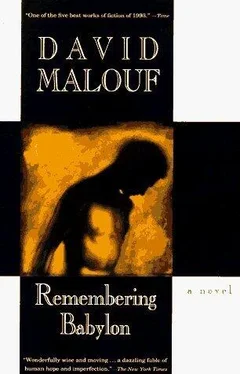She stood there again and found herself saying: ‘I sometimes think that that was all I ever knew of him: what struck me in that moment before I knew him at all. When he was up there’ (she saw the hooked toes again, dusty and misshapen, the muscles of his scraggy neck where the head was thrown back), ‘before he fell, poor fellow, and became just — there’s nothing clear in my head of what he might have been before that, and afterwards he was just Gemmy, someone we loved.’
Loved. The word, which she had used as if there was nothing problematical in naming thus such a tumult of feelings, released a weight in him that he felt shift and fall away.
‘And while he was up there?’
‘I don’t know. Except that I have never seen anyone clearer in all my life. All that he was. All.’
He looked at her with his watery blue eyes, red-rimmed now in the blotched flesh, but the same eyes that had looked up, bold and fearful, at what was in the sights of the make-believe gun he had raised, the dry stick fallen from some ringbarked tree that had lain on the earth a season, dead, and which he had picked up out of its tree-life and refashioned, in their world, into a weapon with all the power of safety in it, of death too, and had pointed at the creature’s heart, and yes , he thought, hit it , and brought him down, and that was the start of it, and so long as the image had life in his head, it was not ended.
She knew the end, such as it was, of the story.
Nine years after Gemmy’s disappearance, Lachlan Beattie had been one of a Government road gang that was surveying the country to the north, preparing the way for a highway that would run, a thread of dust, through all the little burgeoning leap-frog settlements, sleepy harbour towns, goldmining camps, scattered dwellings round a railhead or timber- or sugar-mill, between Brisbane and, fifteen hundred miles further on into the tropics, the last of Governor Bowen’s little far-flung struggling ports; across canelands sickly sweet with molasses, rainforests, dried-out, sparsely-forested cattle country with nine-foot anthills, and a hundred flash-flooding creeks and wide mangrove-fringed streams. He knew the country up there. He knew a little of the native languages. He had been working for the past three years, first as a labourer, then as a foreman, on road gangs all up and down the coast; work of an animal kind that would burn away, he believed, the last of boyhood in him, and his exorbitant dreams.
In each place they came to, from odd natives who came out of the scrub to watch them set up their surveying gear, and peg and measure, and lend a hand at times if it amused them, and the straggling groups they met who were trooping, miserably now, from one camping site to the next, he made enquiries. Only he would know, she thought, with what emotion, what excitement at the possibility of coming face to face again with someone he had once been fond of; what dread too, since his conscience was not clear. She had known nothing in those days of what he was feeling. They were no longer close.
He did hear something at last, though there was no certainty in it. The clan it involved might not have been the one he was seeking. He had only a few words of their language, picked up from Gemmy and poorly learned, and the place was further north than he had estimated.
It involved a ‘dispersal’ six years before by a group of cattlemen and two native troopers, too slight an affair to be called a massacre, and no newspaper had got hold of it. The blacks had been ridden down and brought to earth by blows from a stirrup iron at the end of a stirrup leather — an effective weapon, when used at a gallop, for smashing skulls. The remnants of the clan, including the young woman who gave him his facts, had scattered and been absorbed into a larger group. The bones of the victims, eight or nine in all, men, women, two small children, they had carried with them and disposed of in the usual way, in parcels in the forks of trees.
The story already had elements in common with others he had heard up here, which when he tried to track them down had proved elusive. Perhaps they were all one story. Whether this one had happened, as the woman claimed, six years ago in her own lifetime, or in her mother’s, or last year, it had been gathered now into the dreamtime of the land itself, a shadowy realm where the bones of facts had already drawn around them the skin of rocks, of beasts, of air.
The young woman offered to guide him there, and since she had been a child at the time, ten or eleven, they took an older woman with them; but she too, when questioned, was vague and would lead him only by indirections. It was he who felt a kind of certainty and clung to it, as they struck away from the coast and came at last to a bit of scrub by a waterhole. The two women squatted behind a rock. They refused to go further. The older woman began to wail.
There were bones — not so many. Eight parcels of bark, two of child size, resting a little above eye-level.
He looked at one dry bundle, then another — they were not distinguishable — and felt nothing more for one than for any of them. His feelings, which had seemed so clear as they approached the place, failed him now. He sorrowed quietly for all, in the hope that it might also cover his bones, if they were here, and decided, without proof, out of a need to free himself at last of a duty he had undertaken, a promise made, and a weight on his heart, that this was the place and that one of these parcels, which could not be disturbed, contained the bones of a man with a jawbone different from the rest, enlarged joints, the mark of an old break on the left leg, whose wandering at last had come to an end, and this was it. When he told his uncle of the thing (Janet had listened without speaking, without meeting his eye), it was as a dry certainty, though she knew he did not believe it. He was tying up one of the loose ends of his own life, which might otherwise have gone on bleeding for ever.
All that, fifty years ago. An age. They were living in another country. He could afford to admit now that it had not ended. Something Gemmy had touched off in them was what they were still living, both, in their different ways. It would end only when they were ended, and maybe not even then. They would come back, as they had now, from the far points they had moved away to, and stand side by side looking up at the figure outlined there against a streaming sky. Still balanced. For a last moment held still by their gaze, their solemn and fearful attention, at the one clear point, till this last, where they were inextricably joined and would always be.
Later, when he was gone, Janet sat in the fading light at the window of her room — she still thought of herself mostly by her original name, and the more so today, under the influence of her cousin’s visit.
Her room was on the other side of the house from the garden. Her hives were out of sight here but they were not out of mind; her work went on, continuous somewhere in her head, and she was pleased to have in sight this other view, these flatlands that as they approached the bay became mud, and later, when the tide rippled in, would be moonlight.
Out there were the houses her little visitors came from: one-roomed shacks on low stumps, behind tumbledown paling fences or rusty wire; yards straggly with sunflowers and strewn with rubbish, old bed frames, a collapsed buggy with only its shafts visible above a riot of morning glory, lines of colourless washing, and in a weedy pile, old beer and castor-oil bottles, charred stick-ends, broken bricks.
Behind the squares of light out there her children would be sitting down to boiled potatoes or bread and dripping, and in a short time now, would sleep, and silkworms, in the dark of shoeboxes, rustling, feeding, would be spinning the sticky gold out of their mouths, the finest thread, and miniature tables and chairs made of white beeswax from which children — Alice, Kevin, Ian, Isabel, Ben — had chewed the last faint sweetness, and on which they had left, in the moulding, their giant fingerprints, would stand in idea! order in the dark of little partitioned rooms, in houses that had been butter-boxes.
Читать дальше












